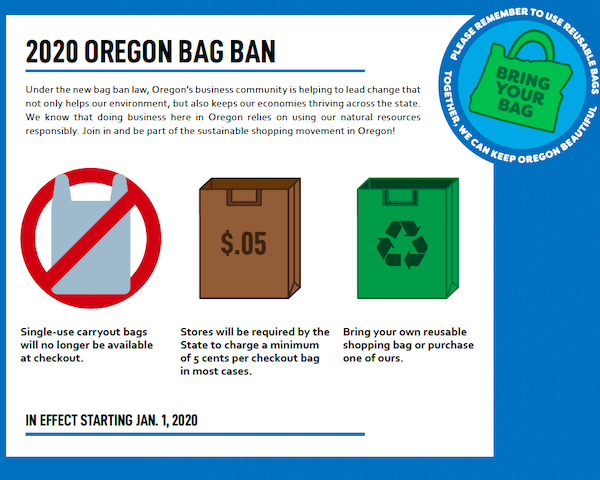
In 2020 Oregonians stand to reduce our plastic bag consumption by over 1 BILLION single-use checkout bags thanks to Oregon’s new bag ban (HB 2509). Most grocery stores, retailers and restaurants complied with the law immediately, while some other stores, more rural or less in the know of current affairs, may need some support. That’s completely understandable, new laws and changes take some time to get used to and fully implement - so we, at Surfrider, would like to do our best to help support consumers, local businesses and governments implement, and celebrate, the new law!
Here are some general tips, FAQs and a snazzy toolkit to help with the new law:

-Full FAQ - Consumers / Businesses / Local Governments
-Business Materials - Break Room Sign, In store sign
-Outreach Materials - Business outreach letter, Letterhead logos, social media branding
What's up with the thicker plastic bags? While all single-use checkout plastic bags are no longer available, it’s likely you’re seeing some thicker “reusable” bags at checkout (for a fee). If the plastic bag is a minimum of 4 mils thick, it meets the criteria of a reusable bag. Most of the thicker bags will have printed information on the back regarding its qualification as a reusable bag, but Oregon's law does not require that information be printed on the bag (as CA law does). The key is that they are charging for those bags, be it only 5 cents, shoppers will take note...and hopefully change their behavior to bring their own. This was a major battle ground for the bill to capture an incentive, that 5 cent charge on paper and reusable bags provided by the store can be viewed as an incentive for people to remember their reusable bags. We learned from other laws in Oregon and while the thicker plastic bags aren't ideal (we'd rather they not be around at all), they aren't free, they are less likely to blow into the environment like single-use bags, more likely to be reused and are generally made from recycled plastic (unlike thinner single-use bags which require virgin plastic in manufacturing).
Don't blame the cashier! We stand to do a lot better in the long run by helping each other. As mentioned previously, it's understandable that some businesses may need some additional support and guidance on the new law. We've developed a few tools and outreach materials in Oregon for businesses such as store front signs to remind consumers of the new law and employee break room signs to help educate employees - access those materials via the toolkit links above.
Somebody call the bag police! Change takes time, be a positive agent for change not a negative one. If your friendly guidance and support isn't well received, it may be appropriate to seek another messenger and/or reach out to your local jurisdiction about enforcement. As with many laws, local code enforcement and compliance officers are generally the go-to folks and your local jurisdiction likely has a complaint form online.
